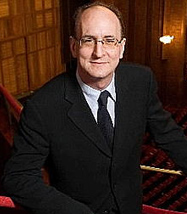Special Reports
2012 Newsmaker Peter Gelb
 Taking risks. Proving his moxy.
Taking risks. Proving his moxy.
 It’s not like Peter Gelb doesn’t have enough reasons to get angry. Opera singers agree to extravagant projects five years in advance and then get cold feet at (sometimes literally) the last minute. Or when he unveils a new multimillion dollar production featuring the highest of high tech, the first question he’s asked is “but the old sets, those threadbare drops and costumes we’ve been staring at for the past three decades, they’re safe, right… for when this newfangled stuff flops?”
It’s not like Peter Gelb doesn’t have enough reasons to get angry. Opera singers agree to extravagant projects five years in advance and then get cold feet at (sometimes literally) the last minute. Or when he unveils a new multimillion dollar production featuring the highest of high tech, the first question he’s asked is “but the old sets, those threadbare drops and costumes we’ve been staring at for the past three decades, they’re safe, right… for when this newfangled stuff flops?”
But even the stress of working an 80-hour week as general manager of the Metropolitan Opera doesn’t excuse acting like a bully, and sadly that’s the reputation Gelb has garnered over the past year or so. First the Met clamped down on hobbyist Bradley Wilber’s web site speculating about repertoire and casting for future Met seasons—apparently because the resource was so accurate that artists and managers were treating it as fact.
Then, in May, WQXR killed, at Gelb’s personal request, a blog post critical of the Met’s new Ring cycle. Just a few weeks later, the news broke that venerable Opera News would be denied the privilege of reviewing the company’s performances, mostly on account of an op-ed piece by one of the magazine’s editors, Brian Kellow, that dished recent casting and productions.
Gelb almost immediately blinked, citing what he euphemistically called a “groundswell of disappointment,” and reinstated the status of Opera News within 24 hours. No harm, no foul, then—except to the GM’s prestige.
So just when it looked like Gelb was permanently doomed to Blue Meanie status, the opera story of the year suddenly broke. On October 11, the Met announced the return of James Levine to conducting after a two-year hiatus due to illness and injuries.
Levine’s comeback is an elaborately complicated process involving scheduling of performances and rehearsals, casting, acommodation for Levine’s ongoing disabilities and, most of all, willingness of the Met o take the risk that the maestro’s recovery may not go off exactly as hoped.
Even if Gelb didn’t personally make every small decision, vet every doctor’s statement, or sign off on the mechanics of the elevator system that will boost Levine to the podium, he is at the top of the chain of command, occupying the desk where the buck stops. What that means is if Levine’s return is a triumph, the whole Met will share in the success; but if something does go wrong, the blame will fall squarely on Gelb.
It’s a precarious position to put yourself in, and there are many world-class intendants who would shy away from taking this level of risk. But if Peter Gelb is not the cuddliest man in the business, neither is he a coward. The Met is a great opera company, and Gelb is now proving himself one of its greatest leaders.





 FEATURED JOBS
FEATURED JOBS

 RENT A PHOTO
RENT A PHOTO


